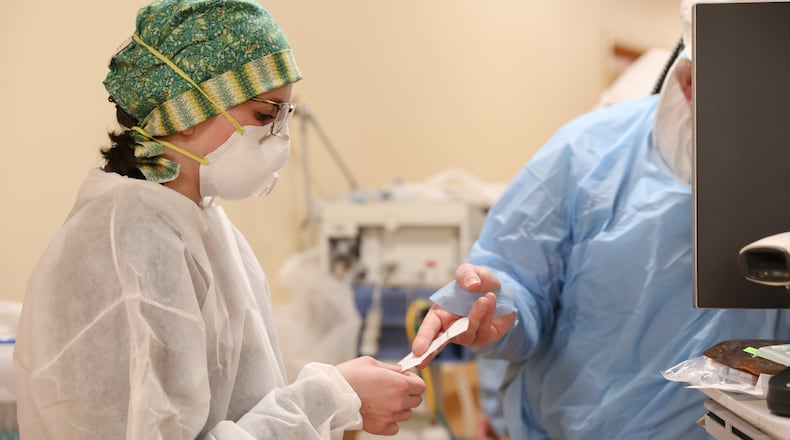“It’s important to emphasize, we’re still okay. We have capacity. But it’s the specter of ever increasing cases that will ultimately impact our capacity at some point to provide all the care that the community needs,” said Dr. Jeffrey Weinstein, infectious disease specialist with Kettering Health Network.
For the local hospital coordinating region, about 85% of ICU beds were occupied as of Oct. 29 and 12.6% were occupied with COVID-19 patients.
The threshold for the Ohio Public Health Advisory system is 80% of ICU beds occupied and 20% of beds occupied with COVID-19 patients for at least three days in the last week. Keeping under that threshold indicates hospitals can handle a surge of severely ill patients.
Statewide, COVID-19 hospitalizations have been climbing in October and nationally counts are also rising.
“It’s not unique to the Miami Valley area. And it’s something that a majority of hospitals across the state and, in fact, many other states are facing right now,” said Dr. Roberto Colón, Miami Valley Hospital associate chief medical officer.
In total, hospitals have previously experienced higher total patient counts, such as flu season, which can push hospitals sometimes to capacity.
“The difference right now, with relation to COVID, is all of the things that are specific to COVID: the isolation, the unknown about the patients when they’re coming in, if they’re going to have the ability to survive the illness or not, and the amount of patients in the community with COVID at the same time,” Colón said.
Colón said the hospital so far has been able to take steps from the surge planning they did earlier in the pandemic and are able to accommodate the increase.
There are some improvements compared to the spring spike. The Dayton area hospital systems have secured more personal protective gear, putting them in a better position than the March scramble. Also, COVID-19 treatment and outcomes have improved since the start of the pandemic, through steroids and prone positioning some patients on their stomachs and other approaches.
However, health care providers locally and nationally, who have been responding to the pandemic since the spring, have also been challenged by stress and burnout.
“We’re trying our best to prevent that provider burnout,” Weinstein said.
Heading into Halloween weekend and then soon Thanksgiving weekend, both physicians emphasized the importance of people continuing to take COVID-19 precautions like wearing masks in public and around others, and avoiding large gatherings.
Local hospitals are not needing to cancel any surgeries or procedures currently because of spread, but Weinstein said those kind of things could become required if numbers keep going up and up to where they might not have enough hospital beds to put COVID-19 patients unless they start taking surgical beds.
“So we need the community to start following the guideline about wearing masks when they’re out in public and around other people, and not attending large gatherings,” Weinstein said. “These are things that are becoming more and more critical as the infrastructure starts getting stressed.”
Along with encouraging mask wearing, Colón said this is the year people need to be considering cancelling party plans.
“I know that it is very difficult because we have been through this pandemic now for the better part of the year,” he said. “But those gatherings right now are just not a great idea whether they are gatherings with family members or large public gatherings. We want to really try to limit that as much as possible.”
Sarah Hackenbracht, CEO of Greater Dayton Area Hospital Association, said the rise in cases is concerning because of the time of year. She said all facilities are managing capacity well, but hospitals have to prepare for the potential of a flu season surge on top of COVID-19 demand.
Flu season changes from year to year, but area flu hospitalizations typically start to climb the end of December. It’s not clear whether COVID-19 infection prevention measures will mean a milder flu season.
“We want to get these COVID cases under control in the region so it doesn’t have any other ramifications,” Hackenbract said.
About the Author


